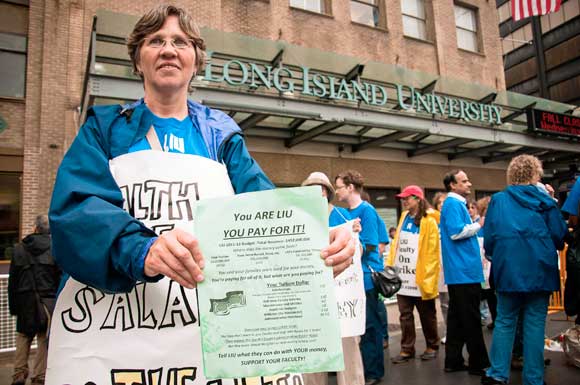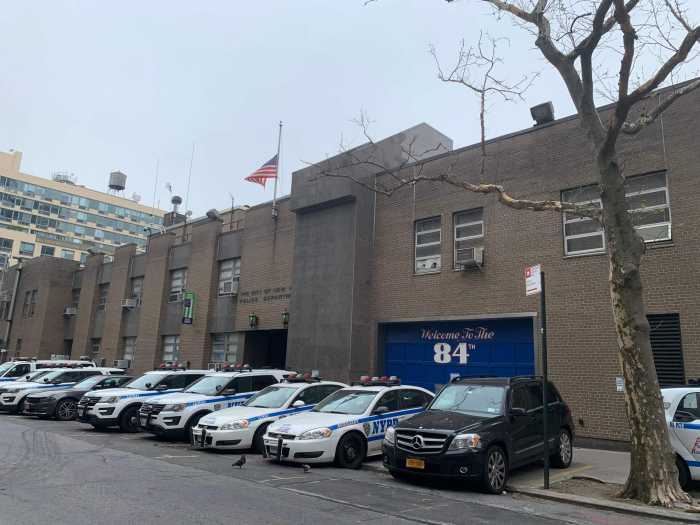Professors at Long Island University have accepted a new contract in a compromise that ends a six-day strike and will return teachers to classroom duty on the Downtown campus today.
Faculty members — who last week organized a walkout to protest a contract offer that they say didn’t offer “a living wage” — ratified a deal that offers more than what administrators first proposed, but less than what they once earned.
Instructors — whose salaries start at $56,000 and can rise to $90,000 — voted to approve a new contract that offers 6-1/2-percent raises over a five-year period, along with a lump-sum payment equal to four percent of their yearly salary.
That’s a bit better than the school’s first offer: A contract that froze faculty salaries for three years, offered a five-percent lump-sum payment, and granted the possibility of a four-percent salary increase — but only if tuition rose during the last two years of the contract.
Professors called the union negotiation a step in the right direction — but certainly not a triumph.
“It’s an imperfect victory,” said Ralph Engelman, a journalism professor who organized the strike after the teachers’ contract, which had given them five-percent raises every year, expired on Aug. 31.
In the end, about 70 percent of the roughly 180 faculty members — who packed into Lafayette Avenue Presbyterian Church for a vote on Monday — supported the new contract, although some said they simply felt pressured to get back to teaching instead of dragging out the conflict.
Students, activists and elected officials — Councilwoman Letitia James (D–Fort Greene) and state Sen. Eric Adams (D–Fort Greene) among them — flooded the church after the vote for a rally to support faculty, calling it an important battle for social justice and labor rights.
The walkout — which is the seventh faculty strike in at the school in the past 34 years — began with faculty hitting the picket lines outside the DeKalb Avenue campus on the first day of school last Wednesday, frustrating students who pay between $30,000 and 40,000 annually and found empty classrooms.
During the strike, a spokesman for the school said that the 11,000-student campus was simply trying to be “fiscally responsible” during difficult financial times, citing a seven-percent drop in the university’s overall enrollment in the past year.
Professors fired back that the university is only spending 13 percent of its annual budget on teachers. Professors added that the school’s emphasis on capital projects — like a wellness center, new graduate dorms and a fancy stadium — were also a sign that teachers are not a top priority.
Administrators hailed the new contract as a success — even as teachers have mixed feelings.
“We are gratified that we were able to achieve a fair and equitable resolution,” school Provost Gale Stevens Haynes said in a statement.
Under the new contract, faculty will also receive a better health care plan — one that offers a fixed rate for five years as opposed increasing yearly.
Even so, some professors said the notion that lump-sums hang on whether tuition increases is objectionable, saying it pits students against teachers.
“It’s an offensive profit-sharing model,” Engelman said.
Some students who spoke at the rally agreed, lambasting the private university’s administrators — such as president David Steinberg, who makes more than $600,000 per year, according to The Chronicle of Higher Education — as money-hungry and disconnected from campus.
One student, Daaimah LaVigne, compared the percentage of her tuition that goes to administration — 55 percent — with the amount that goes to faculty salaries, calling it a misuse of power.
“It’s absolutely disturbing,” she said. “And, quite frankly, it makes me angry.”
Politicians such as James played a safer card, hailing the unity and conviction of the faculty — and saying only that she “reject[s] the corporate model that has taken over at LIU.”
Professors — who will return to classes today — echoed that idea, saying they don’t consider the battle completely over.
“It’s wake-up call to management,” said Michael Pelias, a philosophy professor.

























